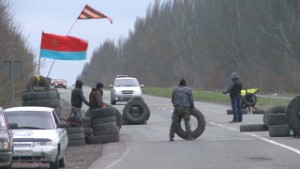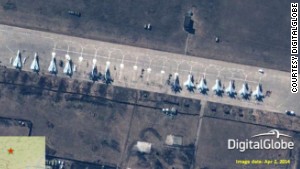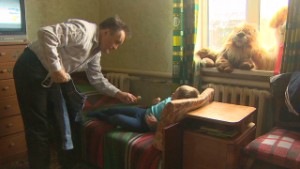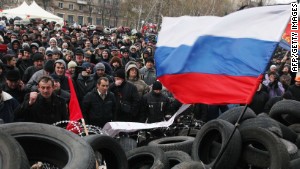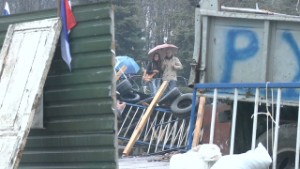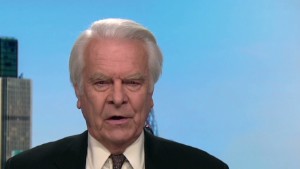The U.N. Security Council has
called an urgent, previously unscheduled meeting Sunday night to discuss the
worsening situation in Ukraine.
The delegation from Luxembourg
tweeted the "urgent consultations" were requested by Russia and would be held at
8 p.m. ET.
The meeting comes the same day
that Ukraine acting President Oleksandr Turchynov issued a promise of amnesty
for pro-Russia separatists in eastern Ukraine but warned that anyone who
continues to support the takeover of government buildings would be held
responsible for their actions.
The acting President added a
warning to "terrorists" who did not comply, saying they would be subject to an
army anti-terrorism operation if they did not comply by 2 a.m. ET Monday.
Similar deadlines have been set and allowed to pass with no consequence.
"We'll not allow any repetition
of the Crimean scenario in the east of Ukraine. I have signed a decree that
would allow those who did not shoot at our officers to lay down their arms and
leave the occupied buildings by Monday morning without fear of being
prosecuted," he told a national television audience, according to a CNN
translation.

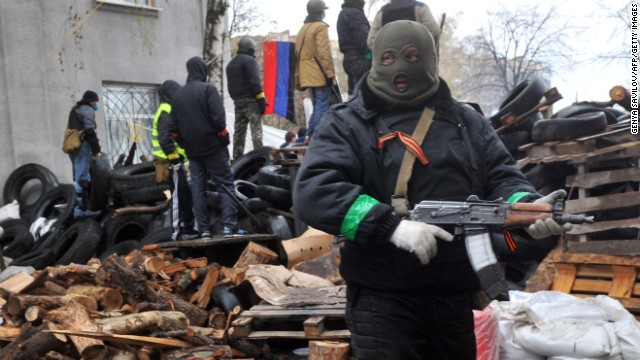 Pro-Russia protesters guard a barricade in Slaviansk,
Ukraine, on Sunday, April 13, outside a regional police building seized by armed
separatists the day before. Ukraine has seen a sharp rise in tensions since a
new pro-European government took charge of the country in February. Moscow
branded the new government illegitimate and annexed Ukraine's Crimea region last
month, citing threats to Crimea's Russian-speaking majority.
Pro-Russia protesters guard a barricade in Slaviansk,
Ukraine, on Sunday, April 13, outside a regional police building seized by armed
separatists the day before. Ukraine has seen a sharp rise in tensions since a
new pro-European government took charge of the country in February. Moscow
branded the new government illegitimate and annexed Ukraine's Crimea region last
month, citing threats to Crimea's Russian-speaking majority.
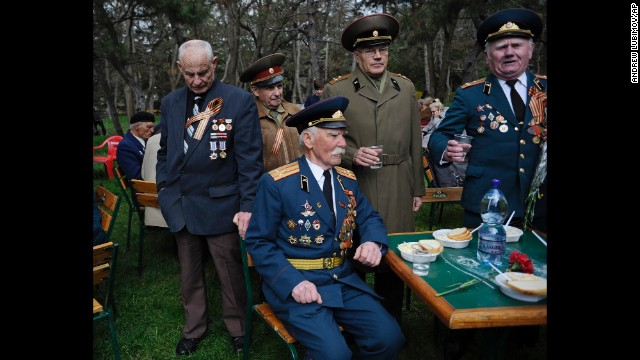 World War II veterans gather on April 13 in Simferopol,
Crimea, during a celebration of the 70th anniversary of the city's liberation
from German troops during World War II.
World War II veterans gather on April 13 in Simferopol,
Crimea, during a celebration of the 70th anniversary of the city's liberation
from German troops during World War II.
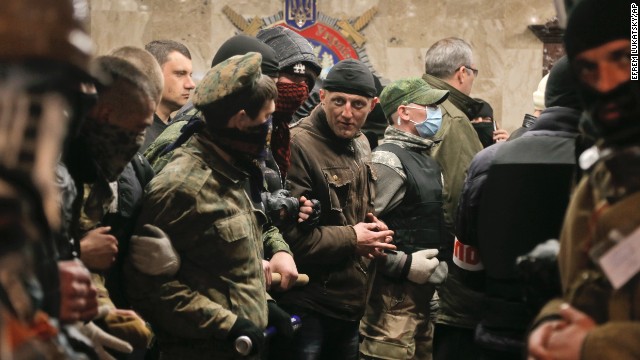 Pro-Russian activists occupy the regional police office in
Donetsk, Ukraine, on Saturday, April 12.
Pro-Russian activists occupy the regional police office in
Donetsk, Ukraine, on Saturday, April 12.
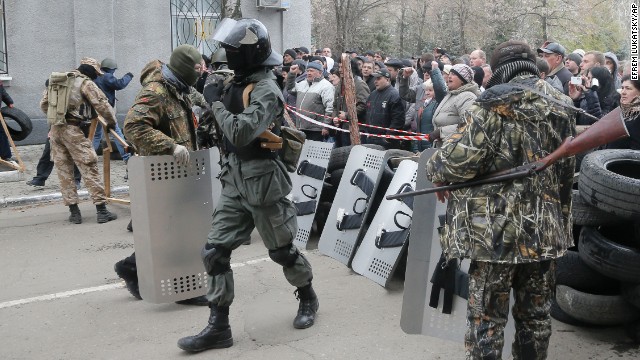 Armed pro-Russian activists carrying riot shields occupy a
police station on April 12. The unidentified armed men arrived at the building
in the town of Slaviansk in the morning and took control of it without any
casualties.
Armed pro-Russian activists carrying riot shields occupy a
police station on April 12. The unidentified armed men arrived at the building
in the town of Slaviansk in the morning and took control of it without any
casualties.
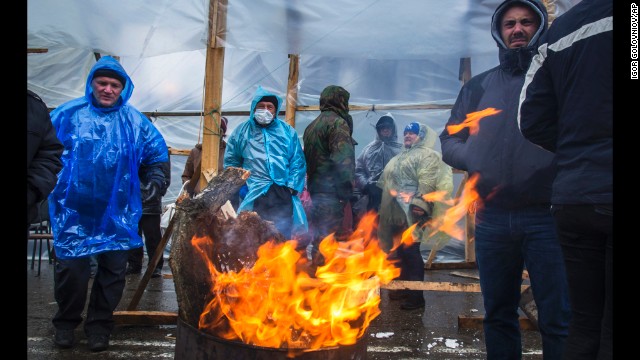 A group of pro-Russian activists warm themselves by a fire
Friday, April 11, in front of a Ukrainian Security Service office in Luhansk,
Ukraine.
A group of pro-Russian activists warm themselves by a fire
Friday, April 11, in front of a Ukrainian Security Service office in Luhansk,
Ukraine.
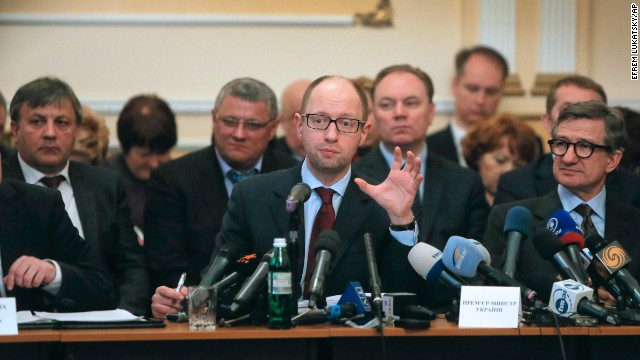 Ukrainian Prime Minister Arseniy Yatsenyuk speaks April 11
during his meeting with regional leaders in Donetsk, Ukraine. Yatsenyuk flew
into Donetsk on Friday, where pro-Russian separatists are occupying the regional
administration building and calling for a referendum.
Ukrainian Prime Minister Arseniy Yatsenyuk speaks April 11
during his meeting with regional leaders in Donetsk, Ukraine. Yatsenyuk flew
into Donetsk on Friday, where pro-Russian separatists are occupying the regional
administration building and calling for a referendum.
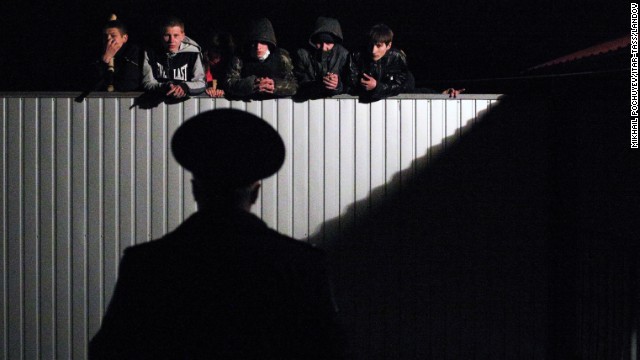 Pro-Russian young men look over the fence of a military
recruitment office in Donetsk on Thursday, April 10.
Pro-Russian young men look over the fence of a military
recruitment office in Donetsk on Thursday, April 10.
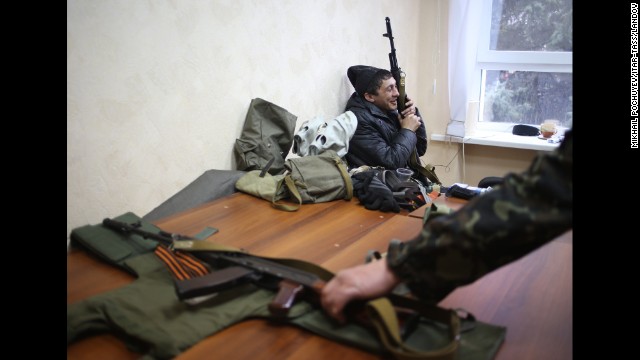 Armed pro-Russian protesters occupy the Security Service
building in Luhansk on April 10.
Armed pro-Russian protesters occupy the Security Service
building in Luhansk on April 10.
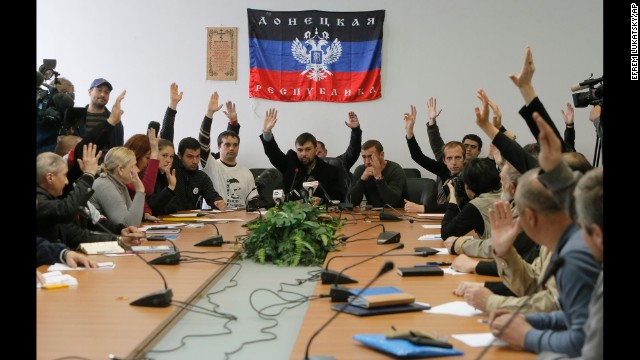 Members of the self-proclaimed government the "Donetsk
Republic" vote April 10 during a meeting at the seized regional administration
building in Donetsk.
Members of the self-proclaimed government the "Donetsk
Republic" vote April 10 during a meeting at the seized regional administration
building in Donetsk.
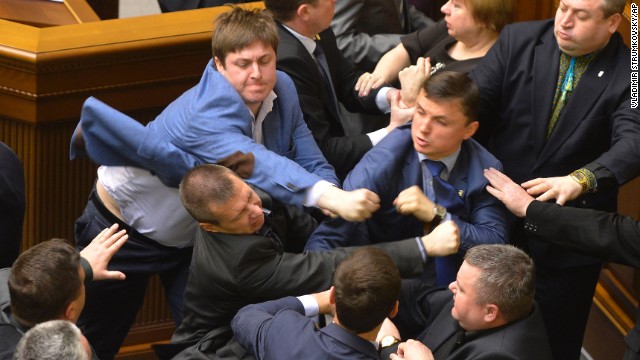 Ukrainian lawmakers from different parties scuffle during
a Parliament session in Kiev, Ukraine, on Tuesday, April 8.
Ukrainian lawmakers from different parties scuffle during
a Parliament session in Kiev, Ukraine, on Tuesday, April 8.
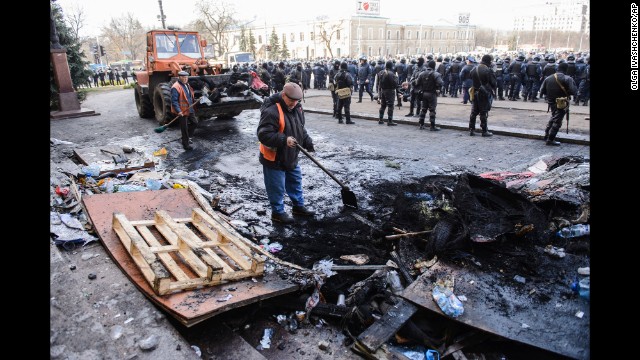 Workers clean up on April 8 after pro-Russian separatists
and police clashed overnight in Kharkiv, Ukraine.
Workers clean up on April 8 after pro-Russian separatists
and police clashed overnight in Kharkiv, Ukraine.
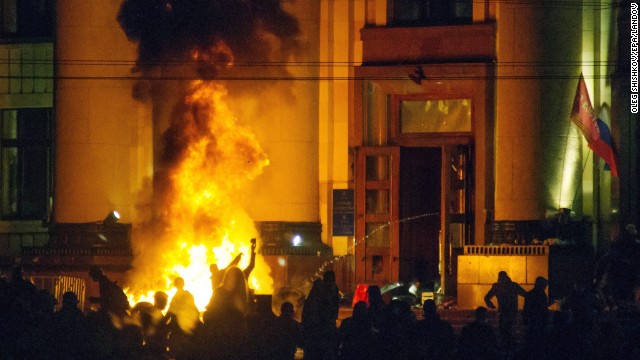 Pro-Russian protesters burn tires near a regional
administration building in Kharkiv after police cleared the building on Monday,
April 7.
Pro-Russian protesters burn tires near a regional
administration building in Kharkiv after police cleared the building on Monday,
April 7.
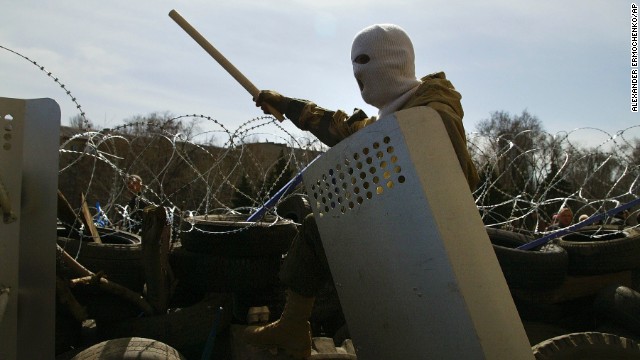 A masked man stands on top of a barricade at the regional
administration building in Donetsk on April 7.
A masked man stands on top of a barricade at the regional
administration building in Donetsk on April 7.
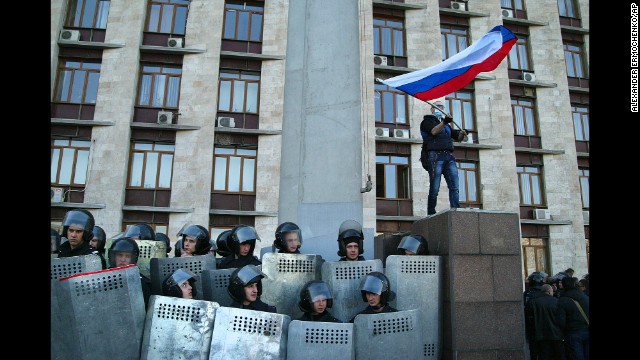 Protesters wave a Russian flag as they storm the regional
administration building in Donetsk on Sunday, April 6. Protesters seized state
buildings in several east Ukrainian cities, prompting accusations from Kiev that
Moscow is trying to "dismember" the country.
Protesters wave a Russian flag as they storm the regional
administration building in Donetsk on Sunday, April 6. Protesters seized state
buildings in several east Ukrainian cities, prompting accusations from Kiev that
Moscow is trying to "dismember" the country.
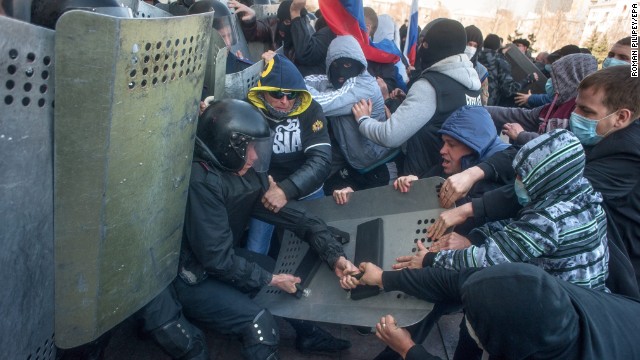 Pro-Russian protesters clash with police as they try to
occupy a regional administration building in Donetsk on April 6.
Pro-Russian protesters clash with police as they try to
occupy a regional administration building in Donetsk on April 6.
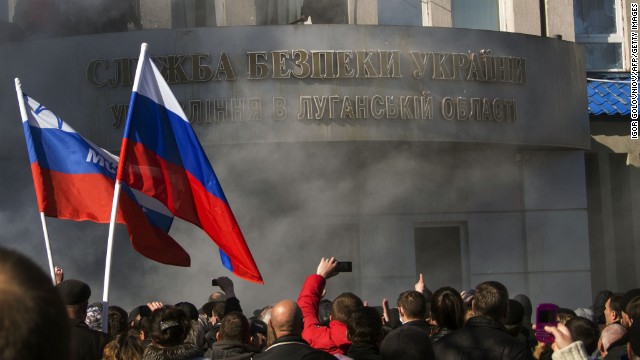 Pro-Russian activists hold a rally in front of a Ukrainian
Security Service office in Luhansk, Ukraine, on April 6.
Pro-Russian activists hold a rally in front of a Ukrainian
Security Service office in Luhansk, Ukraine, on April 6.
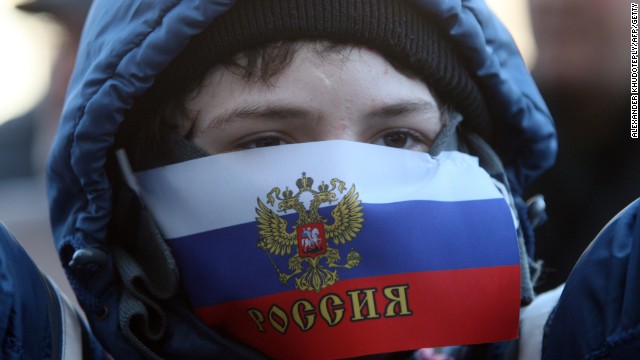 A young demonstrator with his mouth covered by a Russian
flag attends a pro-Russia rally outside the regional government administration
building in Donetsk on Saturday, April 5.
A young demonstrator with his mouth covered by a Russian
flag attends a pro-Russia rally outside the regional government administration
building in Donetsk on Saturday, April 5.
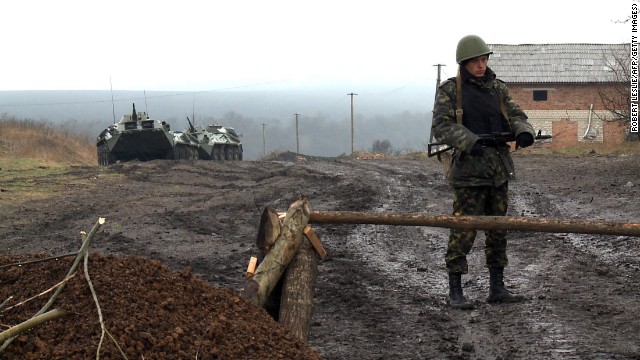 A Ukrainian soldier guards a road not far from Prokhody, a
village near the Russian border, on April 5. Ukrainian and Western officials
have voiced alarm about Russia's reported military buildup on Ukraine's eastern
border.
A Ukrainian soldier guards a road not far from Prokhody, a
village near the Russian border, on April 5. Ukrainian and Western officials
have voiced alarm about Russia's reported military buildup on Ukraine's eastern
border.
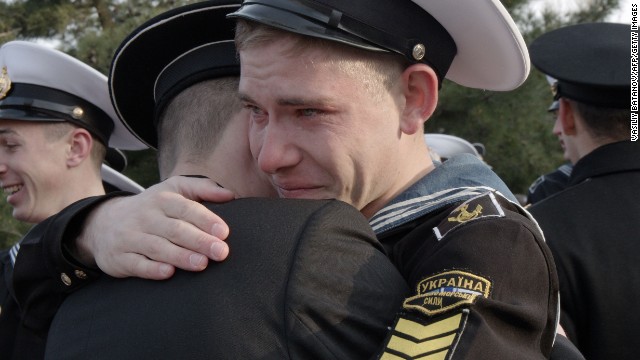 Ukrainian cadets at the Higher Naval School embrace a
friend who has decided to stay in the school during a departure ceremony in
Sevastopol, Crimea, on Friday, April 4. Some 120 cadets who refused to take
Russian citizenship left the school to return to Ukraine.
Ukrainian cadets at the Higher Naval School embrace a
friend who has decided to stay in the school during a departure ceremony in
Sevastopol, Crimea, on Friday, April 4. Some 120 cadets who refused to take
Russian citizenship left the school to return to Ukraine.
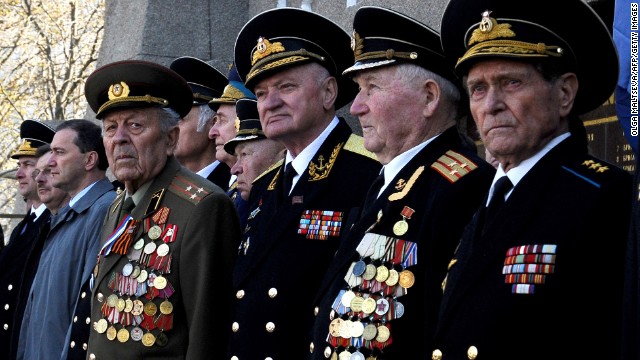 Soviet military veterans take part in a flower-laying
ceremony at the Soviet-era World War II memorial in Sevastopol on Thursday,
April 3.
Soviet military veterans take part in a flower-laying
ceremony at the Soviet-era World War II memorial in Sevastopol on Thursday,
April 3.
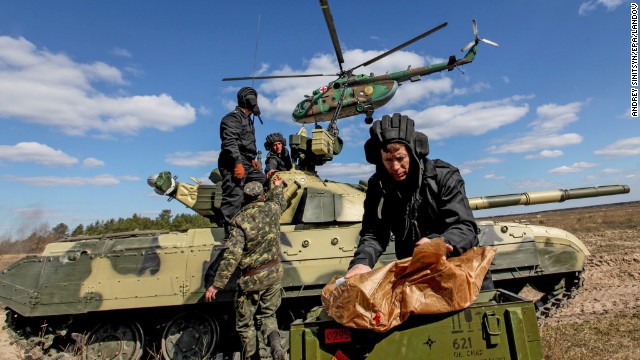 Ukrainian soldiers conduct a training session on the Desna
military shooting range northeast of Kiev on Wednesday, April 2.
Ukrainian soldiers conduct a training session on the Desna
military shooting range northeast of Kiev on Wednesday, April 2.
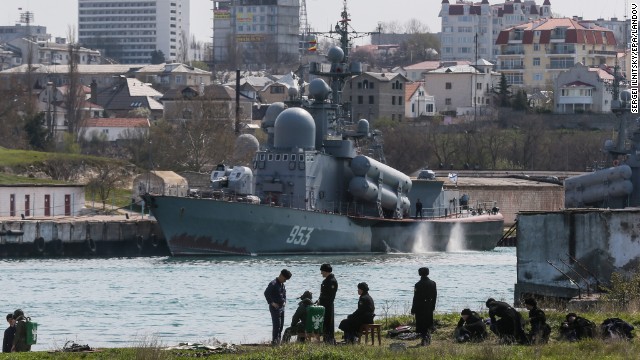 Russian soldiers prepare for diving training in front of a
Tarantul-III class missile boat Tuesday, April 1, in Sevastopol.
Russian soldiers prepare for diving training in front of a
Tarantul-III class missile boat Tuesday, April 1, in Sevastopol.
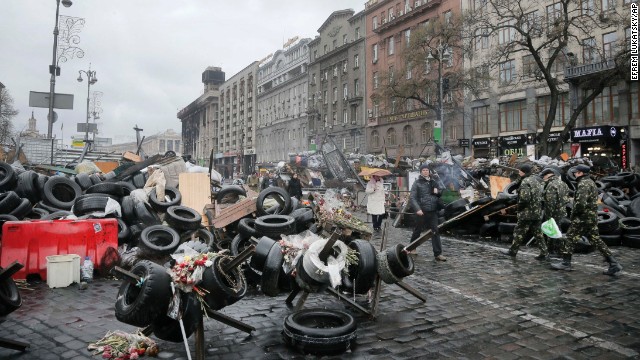 People pass by barricades near the Dnipro Hotel in Kiev on
April 1.
People pass by barricades near the Dnipro Hotel in Kiev on
April 1.
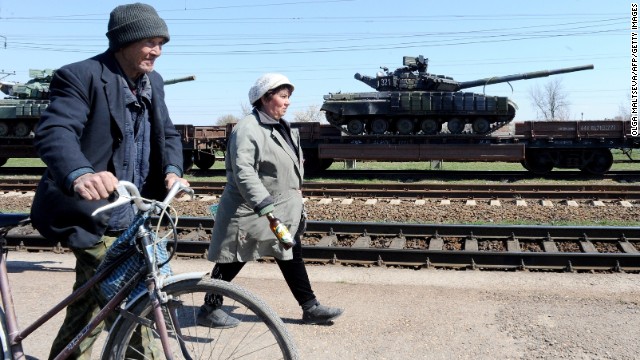 People walk past a train loaded with Russian tanks Monday,
March 31, in the Gvardeyskoe railway station near Simferopol, Crimea.
People walk past a train loaded with Russian tanks Monday,
March 31, in the Gvardeyskoe railway station near Simferopol, Crimea.
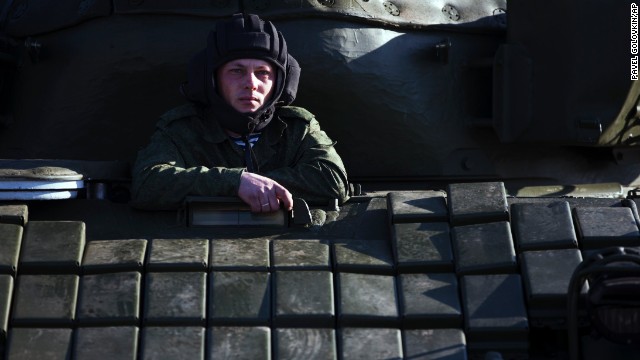 A Russian solder sits in a tank at the Ostryakovo railway
station, not far from Simferopol on March 31.
A Russian solder sits in a tank at the Ostryakovo railway
station, not far from Simferopol on March 31.
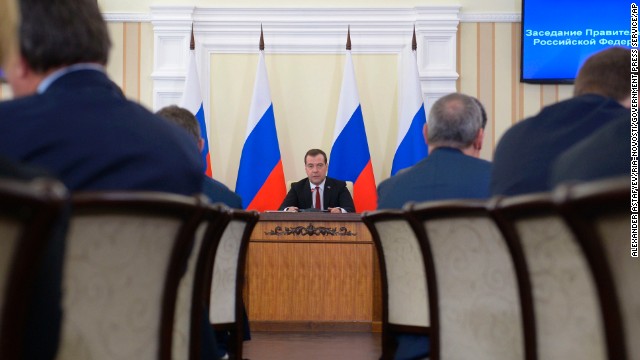 Russian Prime Minister Dmitry Medvedev speaks about the
economic development of Crimea during a meeting March 31 in Simferopol.
Russian Prime Minister Dmitry Medvedev speaks about the
economic development of Crimea during a meeting March 31 in Simferopol.
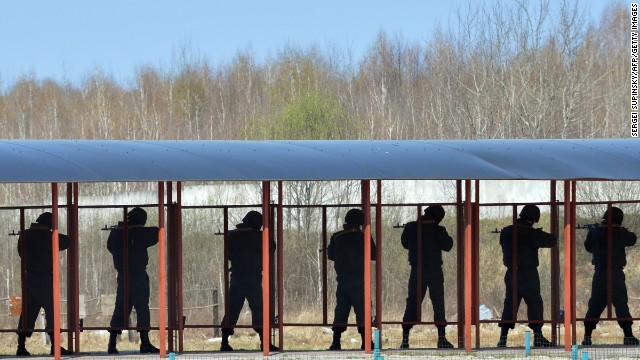 Members of the Ukrainian National Guard take part in
military exercises on a shooting range near Kiev on March 31.
Members of the Ukrainian National Guard take part in
military exercises on a shooting range near Kiev on March 31.
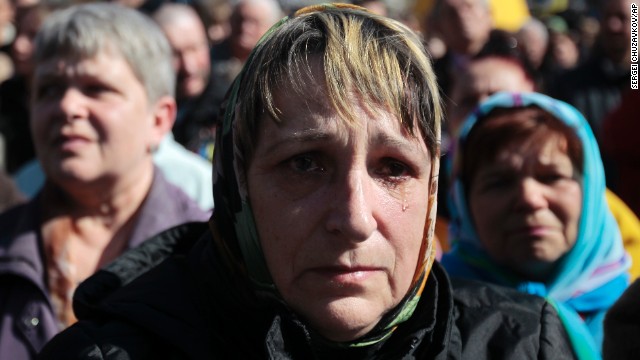 A woman cries Sunday, March 30, during a gathering to
honor those who were killed during protests in Kiev's Independence
Square.
A woman cries Sunday, March 30, during a gathering to
honor those who were killed during protests in Kiev's Independence
Square.
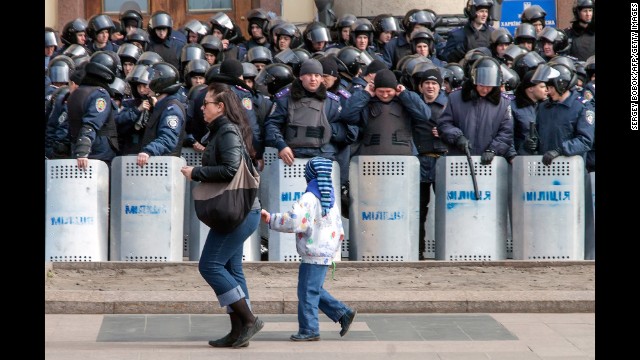 A woman and child walk past a line of police officers
during a rally in Kharkiv, Ukraine, on March 30.
A woman and child walk past a line of police officers
during a rally in Kharkiv, Ukraine, on March 30.
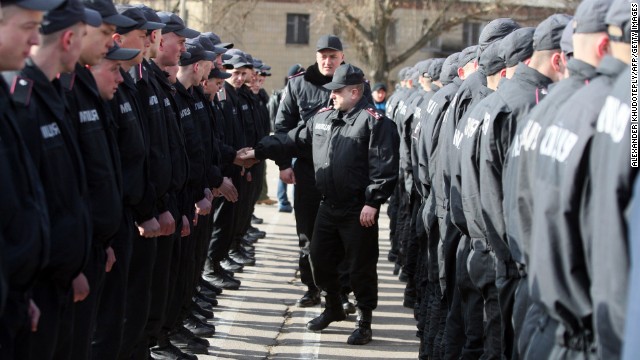 Ukrainian soldiers take part in a training exercise at a
military base in Donetsk, Ukraine, on Saturday, March 29.
Ukrainian soldiers take part in a training exercise at a
military base in Donetsk, Ukraine, on Saturday, March 29.
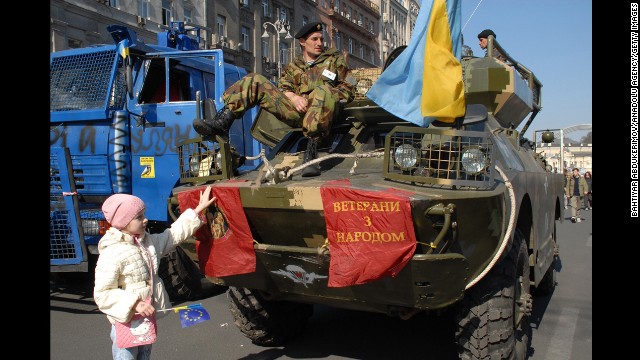 Demonstrators protest Friday, March 28, in Kiev,
displaying police vehicles they seized during earlier clashes with
authorities.
Demonstrators protest Friday, March 28, in Kiev,
displaying police vehicles they seized during earlier clashes with
authorities.
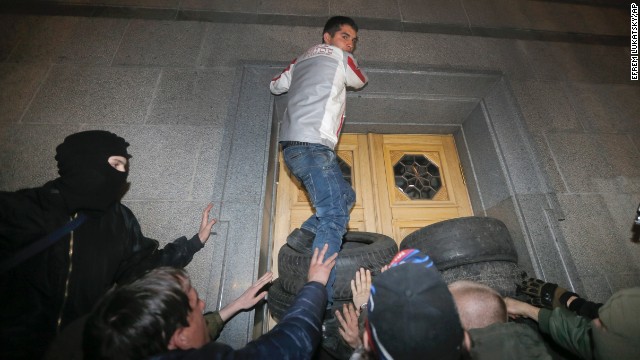 Members of the Right Sector group block the Ukrainian
parliament building in Kiev on Thursday, March 27. Activists called for Interior
Minister Arsen Avakov to step down after the recent killing of radical
nationalist leader Oleksandr Muzychko, who died during a police operation to
detain him. Muzychko and the Right Sector are credited with playing a lead role
in the protests that toppled Ukrainian President Victor Yanukovych.
Members of the Right Sector group block the Ukrainian
parliament building in Kiev on Thursday, March 27. Activists called for Interior
Minister Arsen Avakov to step down after the recent killing of radical
nationalist leader Oleksandr Muzychko, who died during a police operation to
detain him. Muzychko and the Right Sector are credited with playing a lead role
in the protests that toppled Ukrainian President Victor Yanukovych.
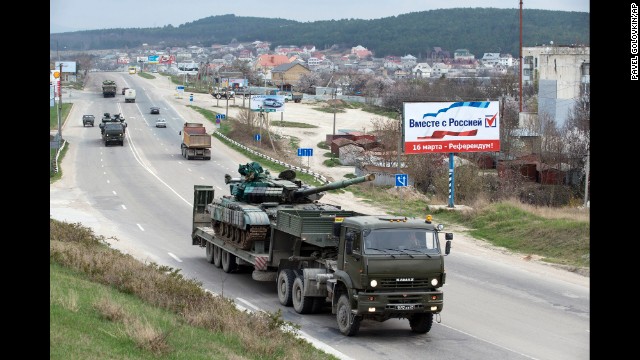 Ukrainian tanks are transported from their base in
Perevalne, Crimea, on Wednesday, March 26. After Russian troops seized most of
Ukraine's bases in Crimea, interim Ukrainian President Oleksandr Turchynov
ordered the withdrawal of armed forces from the Black Sea peninsula, citing
Russian threats to the lives of military staff and their families.
Ukrainian tanks are transported from their base in
Perevalne, Crimea, on Wednesday, March 26. After Russian troops seized most of
Ukraine's bases in Crimea, interim Ukrainian President Oleksandr Turchynov
ordered the withdrawal of armed forces from the Black Sea peninsula, citing
Russian threats to the lives of military staff and their families.
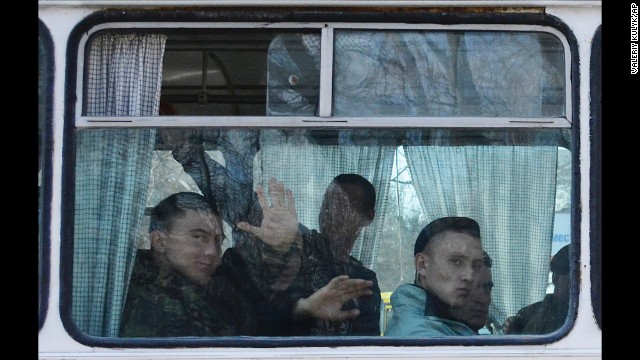 Ukrainian marines wave as they leave a base in Feodosia,
Crimea, on Tuesday, March 25.
Ukrainian marines wave as they leave a base in Feodosia,
Crimea, on Tuesday, March 25.
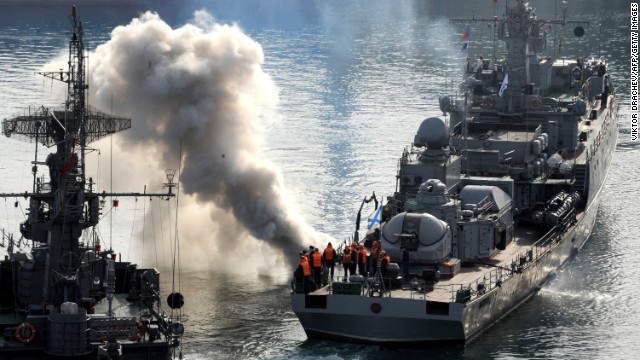 Russian sailors stand on the deck of the corvette ship
Suzdalets in the bay of Sevastopol on March 25.
Russian sailors stand on the deck of the corvette ship
Suzdalets in the bay of Sevastopol on March 25.
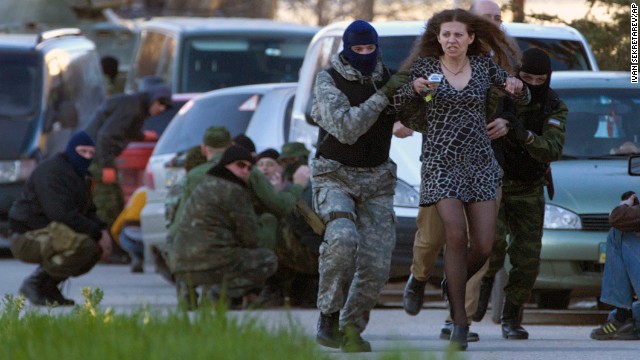 Pro-Russian militia members remove a resident as Russian
troops assault the Belbek air base, outside Sevastopol, on Saturday, March 22.
After its annexation of Crimea, Russian forces have consolidated their control
of the region.
Pro-Russian militia members remove a resident as Russian
troops assault the Belbek air base, outside Sevastopol, on Saturday, March 22.
After its annexation of Crimea, Russian forces have consolidated their control
of the region.
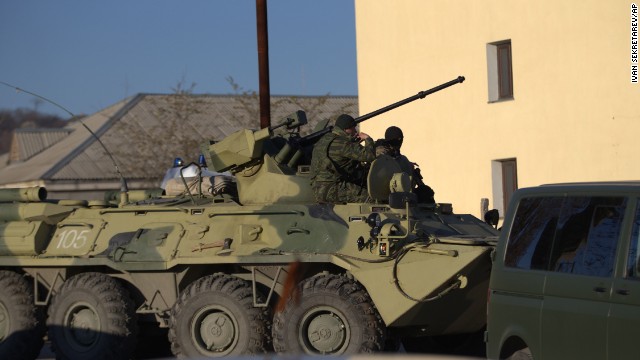 Soldiers in unmarked uniforms sit atop an armored
personnel carrier at the gate of the Belbek air base on March 22.
Soldiers in unmarked uniforms sit atop an armored
personnel carrier at the gate of the Belbek air base on March 22.
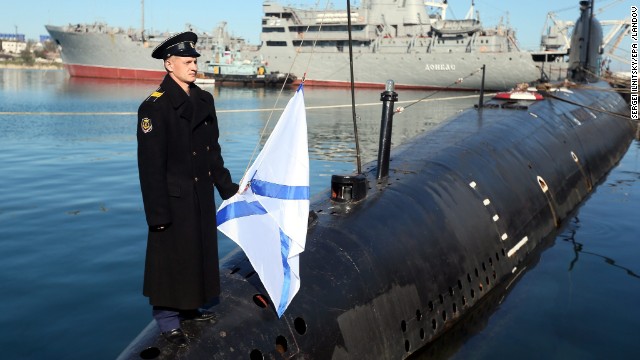 A Russian sailor holds the Russian Navy's St. Andrew's
flag while standing on the bow of the surrendered Ukrainian submarine Zaporozhye
on March 22 in Sevastopol.
A Russian sailor holds the Russian Navy's St. Andrew's
flag while standing on the bow of the surrendered Ukrainian submarine Zaporozhye
on March 22 in Sevastopol.
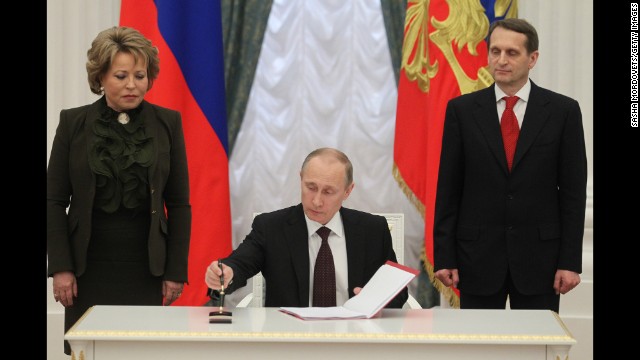 Russian President Vladimir Putin signs the final decree
completing the annexation of Crimea on Friday, March 21, as Upper House Speaker
Valentina Matviyenko, left, and State Duma Speaker Sergei Naryshkin watch.
Russian President Vladimir Putin signs the final decree
completing the annexation of Crimea on Friday, March 21, as Upper House Speaker
Valentina Matviyenko, left, and State Duma Speaker Sergei Naryshkin watch.
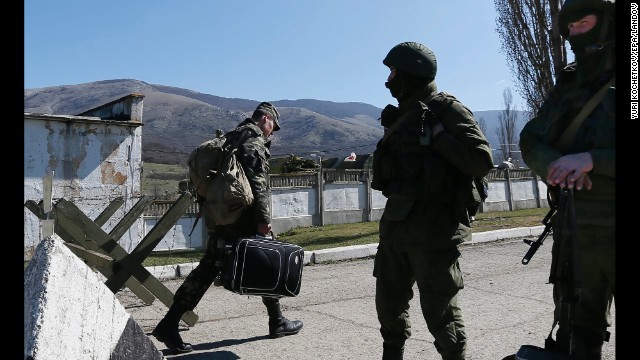 A Ukrainian serviceman leaves a Ukrainian military unit
that Russian soldiers took control of in Perevalne on March 21.
A Ukrainian serviceman leaves a Ukrainian military unit
that Russian soldiers took control of in Perevalne on March 21.
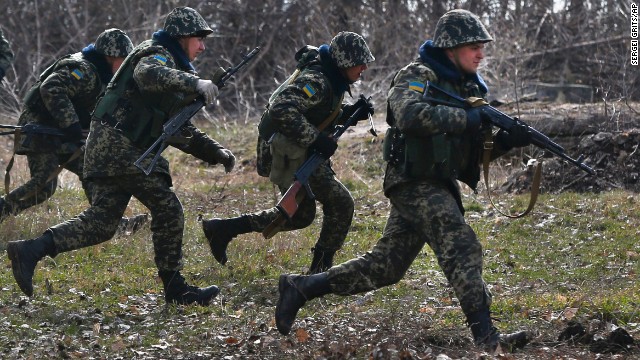 Ukrainian border guards run during training at a military
camp in Alekseyevka, Ukraine, on March 21.
Ukrainian border guards run during training at a military
camp in Alekseyevka, Ukraine, on March 21.
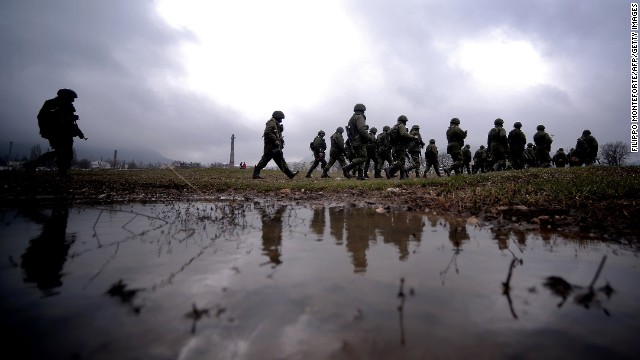 Russian soldiers patrol the area surrounding a Ukrainian
military unit in Perevalne on Thursday, March 20.
Russian soldiers patrol the area surrounding a Ukrainian
military unit in Perevalne on Thursday, March 20.
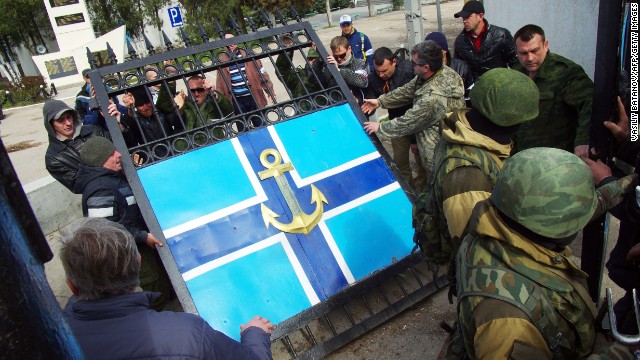 Pro-Russian protesters remove the gate to the Ukrainian
navy headquarters as Russian troops stand guard in Sevastopol on Wednesday,
March 19.
Pro-Russian protesters remove the gate to the Ukrainian
navy headquarters as Russian troops stand guard in Sevastopol on Wednesday,
March 19.
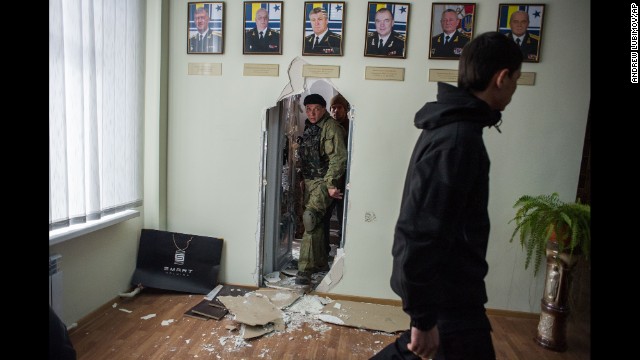 Pro-Russian forces walk inside the Ukrainian navy
headquarters in Sevastopol on March 19.
Pro-Russian forces walk inside the Ukrainian navy
headquarters in Sevastopol on March 19.
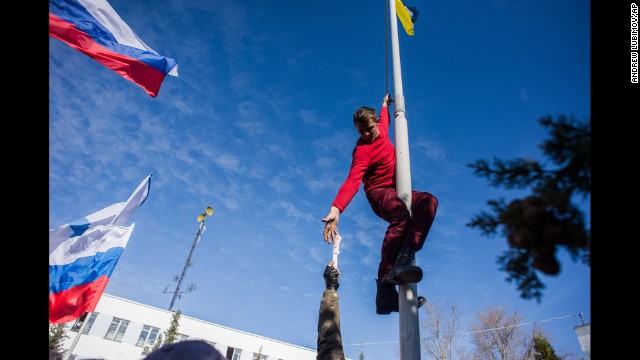 A member of pro-Russian forces takes down a Ukrainian flag
at the Ukrainian navy headquarters in Sevastopol on March 19.
A member of pro-Russian forces takes down a Ukrainian flag
at the Ukrainian navy headquarters in Sevastopol on March 19.
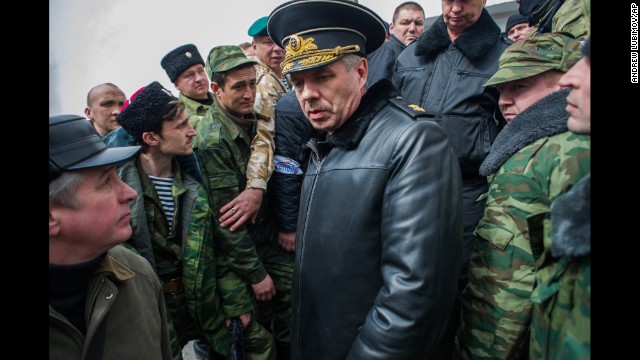 Alexander Vitko, chief of the Russian Black Sea Fleet,
leaves the Ukrainian navy headquarters in Sevastopol after pro-Russian forces
took it over on March 19.
Alexander Vitko, chief of the Russian Black Sea Fleet,
leaves the Ukrainian navy headquarters in Sevastopol after pro-Russian forces
took it over on March 19.
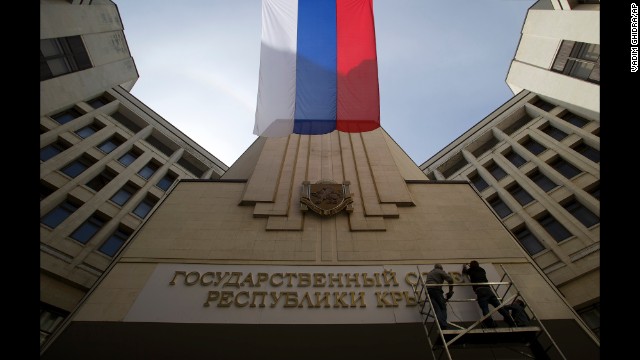 A Russian flag waves as workers install a new sign on a
parliament building in Simferopol, Crimea's capital, on March 19.
A Russian flag waves as workers install a new sign on a
parliament building in Simferopol, Crimea's capital, on March 19.
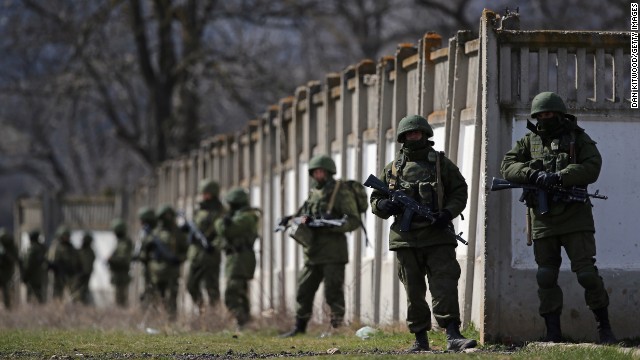 Russian military personnel surround a Ukrainian military
base in Perevalne on March 19.
Russian military personnel surround a Ukrainian military
base in Perevalne on March 19.
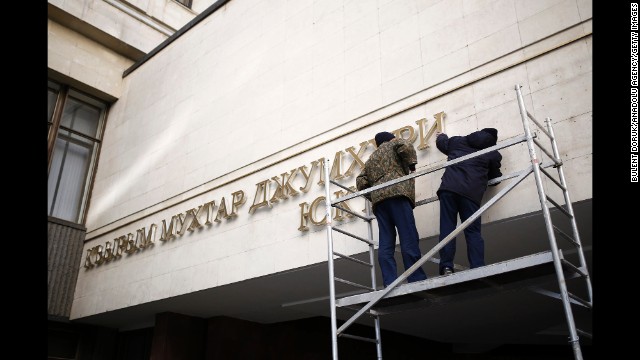 Nameplates on the front of the Crimean parliament building
get removed Tuesday, March 18, in Simferopol.
Nameplates on the front of the Crimean parliament building
get removed Tuesday, March 18, in Simferopol.
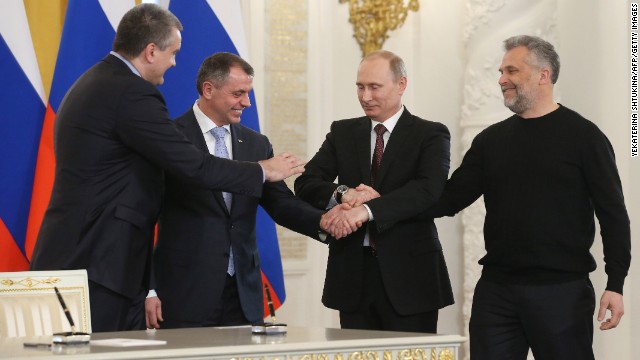 From left, Crimean Prime Minister Sergey Aksyonov;
Vladimir Konstantinov, speaker of the Crimean parliament; Russian President
Vladimir Putin; and Alexei Chaly, the new de facto mayor of Sevastopol, join
hands in Moscow on March 18 after signing a treaty to make Crimea part of
Russia.
From left, Crimean Prime Minister Sergey Aksyonov;
Vladimir Konstantinov, speaker of the Crimean parliament; Russian President
Vladimir Putin; and Alexei Chaly, the new de facto mayor of Sevastopol, join
hands in Moscow on March 18 after signing a treaty to make Crimea part of
Russia.
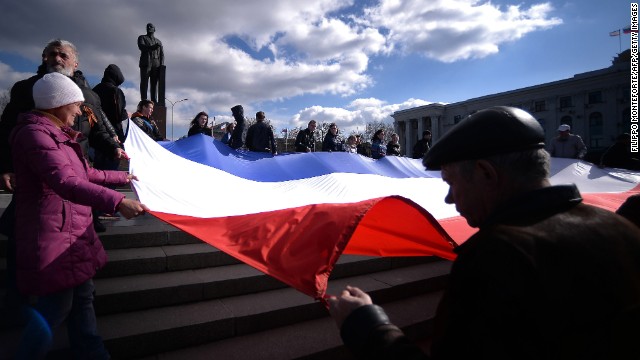 Demonstrators hold a Crimean flag at Lenin Square in
Simferopol on March 18.
Demonstrators hold a Crimean flag at Lenin Square in
Simferopol on March 18.
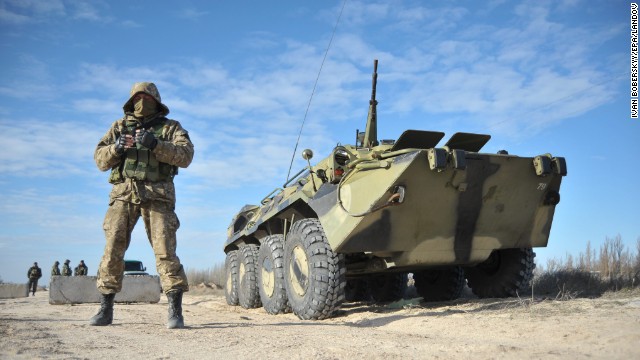 Ukrainian soldiers stand guard at a checkpoint near
Strilkove, Ukraine, close to Crimea on Monday, March 17.
Ukrainian soldiers stand guard at a checkpoint near
Strilkove, Ukraine, close to Crimea on Monday, March 17.
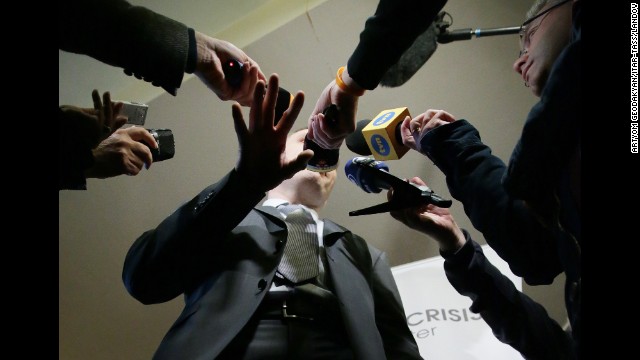 Former boxer and Ukrainian politician Vitali Klitschko
addresses reporters in Kiev on March 17.
Former boxer and Ukrainian politician Vitali Klitschko
addresses reporters in Kiev on March 17.
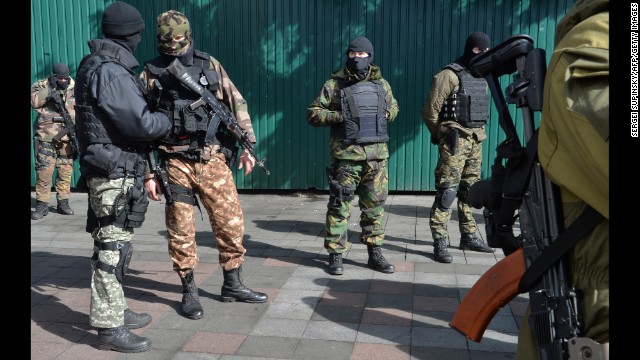 Ukrainian troops stand guard in front of the Ukrainian
Parliament building in Kiev on March 17.
Ukrainian troops stand guard in front of the Ukrainian
Parliament building in Kiev on March 17.
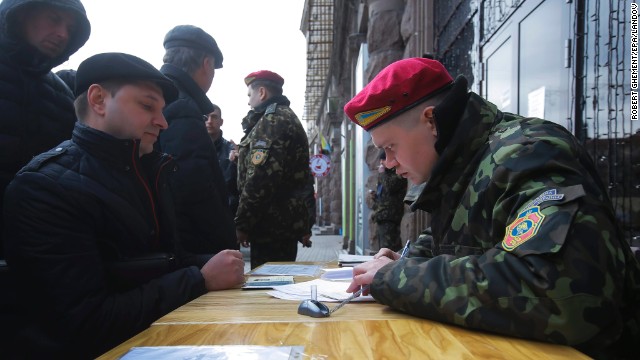 A Ukrainian man applies for the National Guard at a mobile
recruitment center in Kiev on March 17.
A Ukrainian man applies for the National Guard at a mobile
recruitment center in Kiev on March 17.
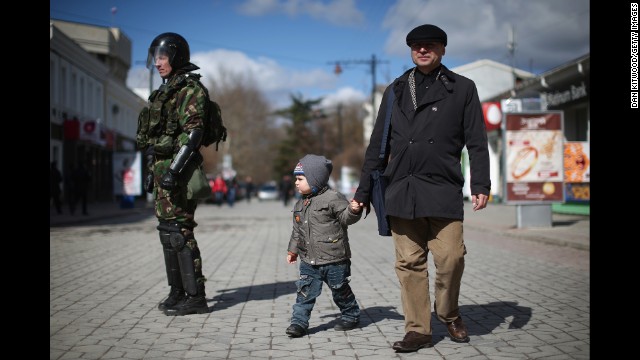 Civilians walk past riot police in Simferopol on March
17.
Civilians walk past riot police in Simferopol on March
17.
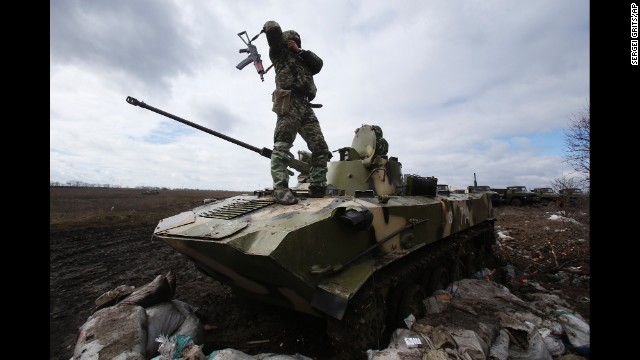 A Ukrainian soldier stands on top of an armored vehicle at
a military camp near the village of Michurino, Ukraine, on March 17.
A Ukrainian soldier stands on top of an armored vehicle at
a military camp near the village of Michurino, Ukraine, on March 17.
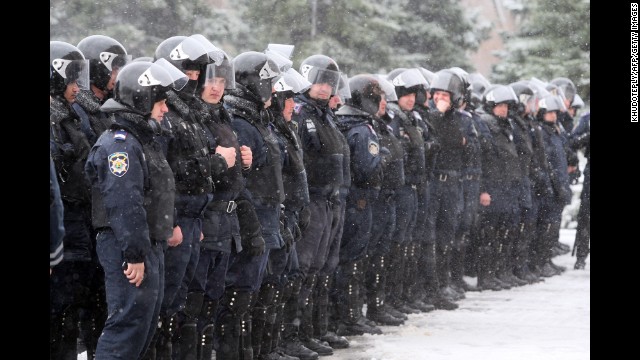 Policemen stand guard outside the regional state
administration building in Donetsk during a rally by pro-Russia activists March
17.
Policemen stand guard outside the regional state
administration building in Donetsk during a rally by pro-Russia activists March
17.
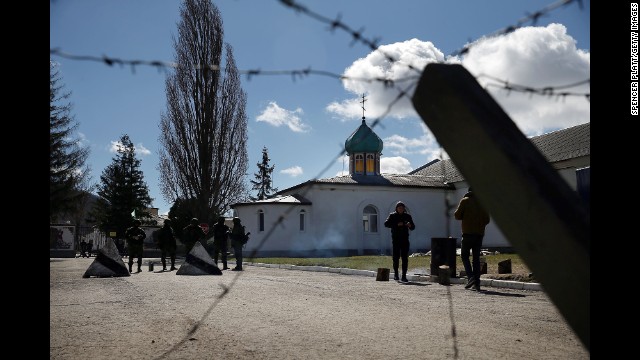 Armed soldiers stand guard outside a Ukrainian military
base in Perevalne on March 17.
Armed soldiers stand guard outside a Ukrainian military
base in Perevalne on March 17.
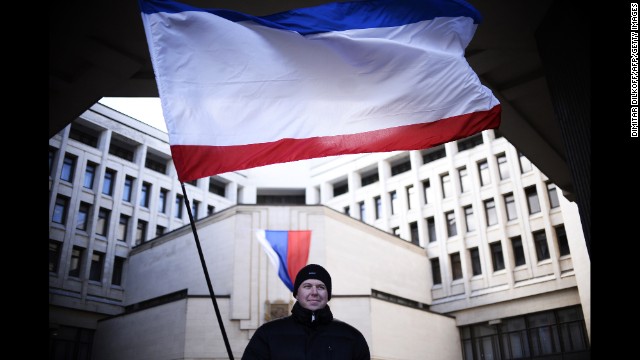 A man holds a Crimean flag as he stands in front of the
Crimean parliament building in Simferopol on March 17.
A man holds a Crimean flag as he stands in front of the
Crimean parliament building in Simferopol on March 17.
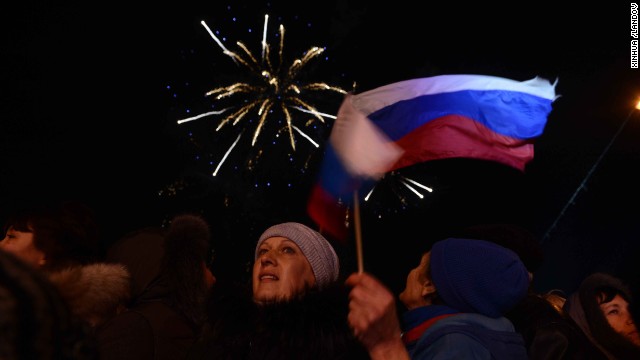 Crimeans holding Russian flags celebrate in front of the
parliament building in Simferopol on Sunday, March 16.
Crimeans holding Russian flags celebrate in front of the
parliament building in Simferopol on Sunday, March 16.
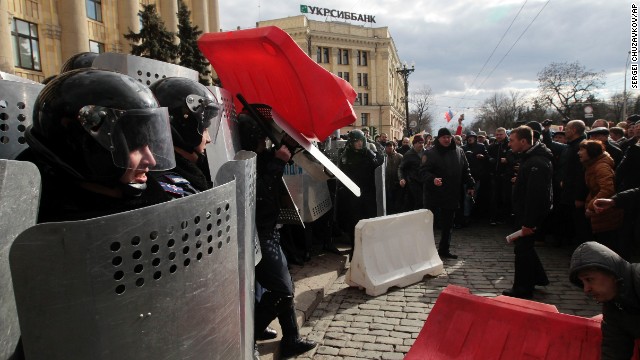 A Ukrainian police officer tries to shield himself from a
road block thrown by pro-Russia supporters in Kharkiv on March 16.
A Ukrainian police officer tries to shield himself from a
road block thrown by pro-Russia supporters in Kharkiv on March 16.
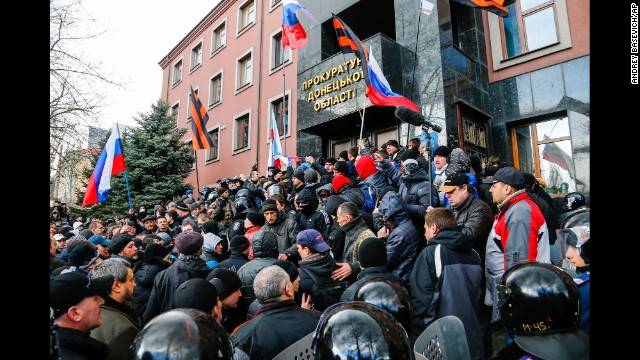 Pro-Russia demonstrators storm the prosecutor general's
office during a rally in Donetsk on March 16.
Pro-Russia demonstrators storm the prosecutor general's
office during a rally in Donetsk on March 16.
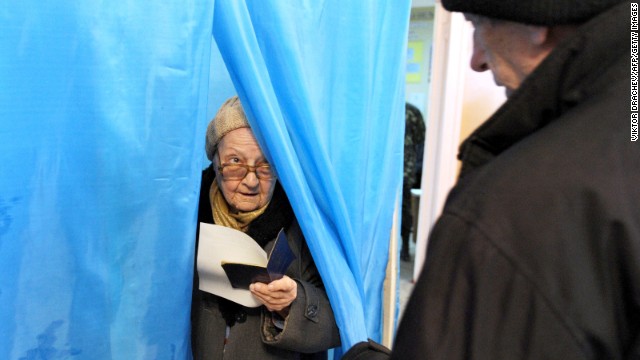 A woman leaves a voting booth in Sevastopol on March 16.
See the crisis in Ukraine before Crimea voted
A woman leaves a voting booth in Sevastopol on March 16.
See the crisis in Ukraine before Crimea voted
Crisis in Ukraine
Crisis in Ukraine
Crisis in Ukraine
Crisis in Ukraine
Crisis in Ukraine
Crisis in Ukraine
Crisis in Ukraine
Crisis in Ukraine
Crisis in Ukraine
Crisis in Ukraine
Crisis in Ukraine
Crisis in Ukraine
Crisis in Ukraine
Crisis in Ukraine
Crisis in Ukraine
Crisis in Ukraine
Crisis in Ukraine
Crisis in Ukraine
Crisis in Ukraine
Crisis in Ukraine
Crisis in Ukraine
Crisis in Ukraine
Crisis in Ukraine
Crisis in Ukraine
Crisis in Ukraine
Crisis in Ukraine
Crisis in Ukraine
Crisis in Ukraine
Crisis in Ukraine
Crisis in Ukraine
Crisis in Ukraine
Crisis in Ukraine
Crisis in Ukraine
Crisis in Ukraine
Crisis in Ukraine
Crisis in Ukraine
Crisis in Ukraine
Crisis in Ukraine
Crisis in Ukraine
Crisis in Ukraine
Crisis in Ukraine
Crisis in Ukraine
Crisis in Ukraine
Crisis in Ukraine
Crisis in Ukraine
Crisis in Ukraine
Crisis in Ukraine
Crisis in Ukraine
Crisis in Ukraine
Crisis in Ukraine
Crisis in Ukraine
Crisis in Ukraine
Crisis in Ukraine
Crisis in Ukraine
Crisis in Ukraine
Crisis in Ukraine
Crisis in Ukraine
Crisis in Ukraine
Crisis in Ukraine
Crisis in Ukraine
Crisis in Ukraine
Crisis in Ukraine
Crisis in Ukraine
Crisis in Ukraine
HIDE CAPTION
 Photos: Crisis in
Ukraine
Photos: Crisis in
Ukraine

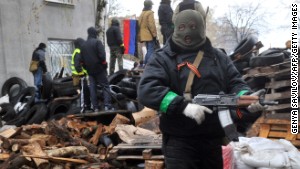 R
R
ussia requests meeting with
UN council
Pro-Russian gunmen seize
building
NATO: Pics show Russian
military buildup
Turchynov added that anyone who
supports violence will be punished.
"We are ready to consider a
significant expansion of regional powers of all regions and the wider reform of
local self-government. However, all those supporting aggressors and occupiers in
an armed struggle against our country will not escape punishment and will be
prosecuted," he said.
Ukraine puts blame on
Russia
Turchynov said Russia was
responsible for bloodshed; at least one Ukrainian soldier was killed in clashes
between pro-Ukrainian crowds and pro-Russian separatists, a high-level source in
Ukraine's Security Services told CNN.
Russian Foreign Minister Sergey
Lavrov tweeted Sunday that Ukrainian authorities must "stop war against their
people" and asked the U.N. Security Council and the Organization for Security
and Cooperation in Europe to give "urgent attention" to the crisis in eastern
Ukraine.
"It now depends on the West to
avoid the possibility of civil war in Ukraine," the Foreign Ministry said in a
statement, describing the situation in southeastern Ukraine as "extremely
dangerous."
Earlier, Ukrainian officials
placed blame for unrest in the eastern section of their country squarely on
their neighbors in Russia in a written statement Sunday from Kiev.
The new Ukrainian government
said the security operations were launched against terrorists who are attempting
to "destroy our country."
"In the eastern regions of
Ukraine, the Russian special service and saboteurs embarked on the large-scale
separatist operations to seize power, destabilize the situation threatening the
lives of citizens of Ukraine, as well as the separation of the regions of our
country," the Foreign Ministry said.
Giving no further details, it
also said it had "concrete evidence of Russian special service involvement" in
the pro-Russian protests and storming of buildings in the east in recent days
and would present it at an international meeting on the Ukraine crisis on
Thursday.
Ukrainian security forces
launched an operation Sunday to clear pro-Russian separatists from a police
headquarters in the eastern city of Slaviansk, officials said.
However, a CNN crew in the city
saw no sign of a large presence of Ukrainian security forces -- with the
exception of a single police car and a helicopter flying above -- nor any
confrontation with the occupiers.
Gunmen dressed in camouflage had
stormed and seized the police building a day earlier in Slaviansk, a town about
100 miles from the Russian border, and set up barricades around
it.
Ukrainian citizens carry cost
of conflict
Russian separatists in Donetsk
dig in
Pro-Russian crowds dwindle in
Luhansk
Owen: Sanctions against Russia
won't work
'Sanctions can
bite'
Samantha Power, the U.S.
ambassador to the United Nations, said the attacks in Slaviansk were
"professional" and "coordinated" -- similar to Russia's incursion into the
Crimean Peninsula last month.
"There's
nothing grass-roots seeming about it," Power said on ABC's "This Week,"
noting the latest action "gives credence" to the notion that Russian President
Vladimir Putin wants control over eastern Ukraine.
The United States is prepared to
step up sanctions against Russia if the recent actions in Ukraine continue, she
said Sunday. Power said told "This Week" the latest events in Ukraine bore "the
telltale signs of Moscow's involvement."
"I think we've seen that the
sanctions can bite. And if actions like the kind that we've seen over the last
few days continue, you're going to see a ramping up of those sanctions," she
said.
The unrest is the latest show of
spiraling anger in eastern Ukraine, which has a large Russian-speaking
population. The region was the support base for pro-Moscow former President
Viktor Yanukovych, who was ousted in February after months of protests in
Kiev.
Speaking Sunday to reporters in
Russia, Yanukovych said the Ukraine is in a new situation now that blood was
shed.
"Ukraine made the first step
toward civil war. The Kiev gang decided and ordered to use force and dispatched
the military forces against the population of southeast Ukraine," he said,
state-run Russia-24 TV reported.
Yanukovych accused the United
States of dictating to the government in Kiev what to do, claiming that CIA
Director John Brennan "effectively sanctioned the use of arms and bloodshed and
therefore the United States should be held responsible for starting a civil war
in Ukraine."
CIA spokesman Dean Boyd declined
to comment on Brennan's travel itinerary.
"But the claim that Director
Brennan encouraged Ukrainian authorities to conduct tactical operations inside
Ukraine is completely false. Like other senior U.S. officials, Director Brennan
strongly believes that a diplomatic solution is the only way to resolve the
crisis between Russia and Ukraine," the spokesman said.
Troops massed on eastern
border
Kiev's fragile new government
and the West accuse Russia of destabilizing the region as a pretext to
potentially send in troops to protect the local Russian-speaking population.
NATO says Russian armed forces
are massing on Ukraine's eastern border, while Moscow says they are merely
carrying out military exercises.
In Kharkiv, Ukraine's second
most populous city, police outside City Hall offered no resistance when
protesters took over the building Sunday afternoon, according to a witness. It
is not clear why the police stepped aside for protesters.
Russian and local Ukrainian
media reported that pro-Russian demonstrators had seized the city hall in
Mariupol, in the southeast, with no violence. Some showed pictures of Russian
flags in the city. The reports could not immediately be independently
confirmed.
Distrust among the population in
the region grew as political power in the national government shifted rapidly in
a pro-Western direction. A short time later, pro-Russian elements occupied the
Black Sea peninsula of Crimea, which Russia quickly annexed. Since then,
pro-Russian protesters have taken to the streets in eastern
Ukrainian regions and in some cases stormed and occupied buildings.
EU foreign minister to
meet
The United States has accused
Russia of fomenting the separatist unrest in its neighbor as a pretext for
military intervention.
U.S. Secretary of State John
Kerry spoke by phone with Lavrov, his Russian counterpart, on Saturday,
expressing "strong concern that attacks today by armed militants in eastern
Ukraine were orchestrated and synchronized, similar to previous attacks in
eastern Ukraine and Crimea," a senior State Department official said.
The official said Kerry warned
Lavrov there would be "additional consequences" if Russia did not take steps to
de-escalate the situation in eastern Ukraine and move its troops back from its
border.
The official also noted that
militants involved in Saturday's unrest in eastern Ukraine "were equipped with
specialized Russian weapons and the same uniforms as those worn by the Russian
forces that invaded Crimea."
NATO described the appearance in
eastern Ukraine of men with specialized Russian weapons and identical uniforms
without insignia -- as previously seen in Crimea -- as a "grave
development."
European Union Foreign Policy
Chief Catherine Ashton is to meet this week with foreign ministers from the
United States, Russia and Ukraine in Switzerland to discuss efforts to
de-escalate the situation.
In a written statement, she
urged Moscow "to call back its troops from the Ukrainian border and to cease any
further actions aimed at destabilising Ukraine."
EU foreign ministers will meet
in Luxembourg on Monday to discuss the crisis.
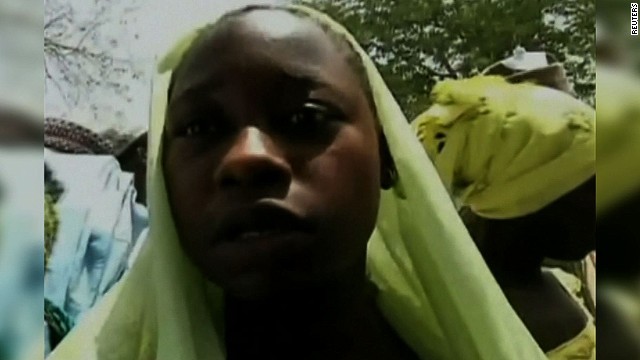
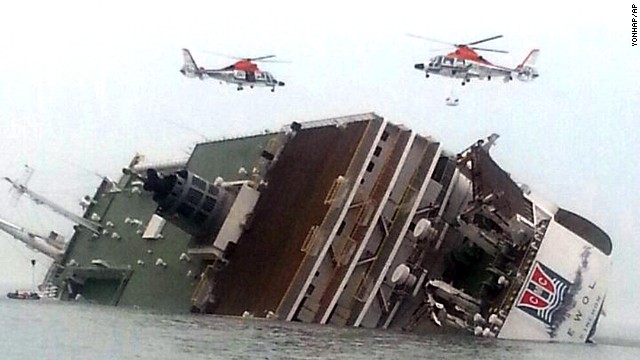 A South Korean ship with over 400 people on board sank off the country's southwestern coast Wednesday.
A South Korean ship with over 400 people on board sank off the country's southwestern coast Wednesday.
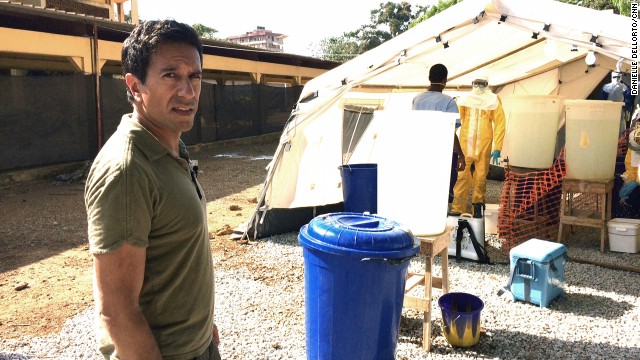
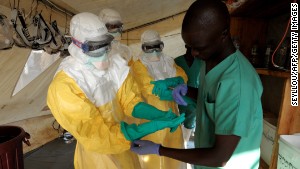
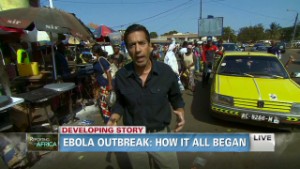
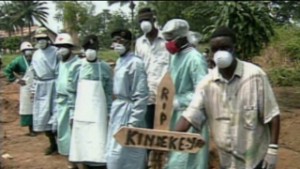
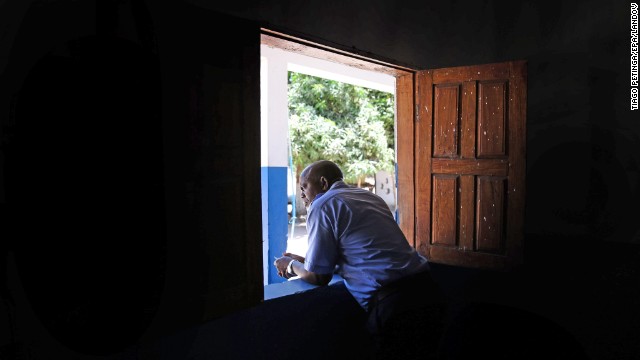
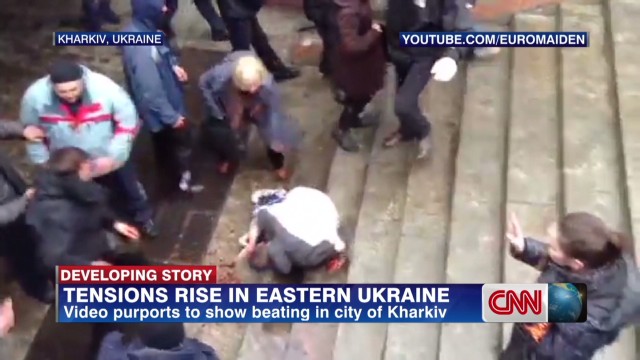
 Pro-Russia protesters guard a barricade in Slaviansk,
Ukraine, on Sunday, April 13, outside a regional police building seized by armed
separatists the day before. Ukraine has seen a sharp rise in tensions since a
new pro-European government took charge of the country in February. Moscow
branded the new government illegitimate and annexed Ukraine's Crimea region last
month, citing threats to Crimea's Russian-speaking majority.
Pro-Russia protesters guard a barricade in Slaviansk,
Ukraine, on Sunday, April 13, outside a regional police building seized by armed
separatists the day before. Ukraine has seen a sharp rise in tensions since a
new pro-European government took charge of the country in February. Moscow
branded the new government illegitimate and annexed Ukraine's Crimea region last
month, citing threats to Crimea's Russian-speaking majority.
 World War II veterans gather on April 13 in Simferopol,
Crimea, during a celebration of the 70th anniversary of the city's liberation
from German troops during World War II.
World War II veterans gather on April 13 in Simferopol,
Crimea, during a celebration of the 70th anniversary of the city's liberation
from German troops during World War II.
 Pro-Russian activists occupy the regional police office in
Donetsk, Ukraine, on Saturday, April 12.
Pro-Russian activists occupy the regional police office in
Donetsk, Ukraine, on Saturday, April 12.
 Armed pro-Russian activists carrying riot shields occupy a
police station on April 12. The unidentified armed men arrived at the building
in the town of Slaviansk in the morning and took control of it without any
casualties.
Armed pro-Russian activists carrying riot shields occupy a
police station on April 12. The unidentified armed men arrived at the building
in the town of Slaviansk in the morning and took control of it without any
casualties.
 A group of pro-Russian activists warm themselves by a fire
Friday, April 11, in front of a Ukrainian Security Service office in Luhansk,
Ukraine.
A group of pro-Russian activists warm themselves by a fire
Friday, April 11, in front of a Ukrainian Security Service office in Luhansk,
Ukraine.
 Ukrainian Prime Minister Arseniy Yatsenyuk speaks April 11
during his meeting with regional leaders in Donetsk, Ukraine. Yatsenyuk flew
into Donetsk on Friday, where pro-Russian separatists are occupying the regional
administration building and calling for a referendum.
Ukrainian Prime Minister Arseniy Yatsenyuk speaks April 11
during his meeting with regional leaders in Donetsk, Ukraine. Yatsenyuk flew
into Donetsk on Friday, where pro-Russian separatists are occupying the regional
administration building and calling for a referendum.
 Pro-Russian young men look over the fence of a military
recruitment office in Donetsk on Thursday, April 10.
Pro-Russian young men look over the fence of a military
recruitment office in Donetsk on Thursday, April 10.
 Armed pro-Russian protesters occupy the Security Service
building in Luhansk on April 10.
Armed pro-Russian protesters occupy the Security Service
building in Luhansk on April 10.
 Members of the self-proclaimed government the "Donetsk
Republic" vote April 10 during a meeting at the seized regional administration
building in Donetsk.
Members of the self-proclaimed government the "Donetsk
Republic" vote April 10 during a meeting at the seized regional administration
building in Donetsk.
 Ukrainian lawmakers from different parties scuffle during
a Parliament session in Kiev, Ukraine, on Tuesday, April 8.
Ukrainian lawmakers from different parties scuffle during
a Parliament session in Kiev, Ukraine, on Tuesday, April 8.
 Workers clean up on April 8 after pro-Russian separatists
and police clashed overnight in Kharkiv, Ukraine.
Workers clean up on April 8 after pro-Russian separatists
and police clashed overnight in Kharkiv, Ukraine.
 Pro-Russian protesters burn tires near a regional
administration building in Kharkiv after police cleared the building on Monday,
April 7.
Pro-Russian protesters burn tires near a regional
administration building in Kharkiv after police cleared the building on Monday,
April 7.
 A masked man stands on top of a barricade at the regional
administration building in Donetsk on April 7.
A masked man stands on top of a barricade at the regional
administration building in Donetsk on April 7.
 Protesters wave a Russian flag as they storm the regional
administration building in Donetsk on Sunday, April 6. Protesters seized state
buildings in several east Ukrainian cities, prompting accusations from Kiev that
Moscow is trying to "dismember" the country.
Protesters wave a Russian flag as they storm the regional
administration building in Donetsk on Sunday, April 6. Protesters seized state
buildings in several east Ukrainian cities, prompting accusations from Kiev that
Moscow is trying to "dismember" the country.
 Pro-Russian protesters clash with police as they try to
occupy a regional administration building in Donetsk on April 6.
Pro-Russian protesters clash with police as they try to
occupy a regional administration building in Donetsk on April 6.
 Pro-Russian activists hold a rally in front of a Ukrainian
Security Service office in Luhansk, Ukraine, on April 6.
Pro-Russian activists hold a rally in front of a Ukrainian
Security Service office in Luhansk, Ukraine, on April 6.
 A young demonstrator with his mouth covered by a Russian
flag attends a pro-Russia rally outside the regional government administration
building in Donetsk on Saturday, April 5.
A young demonstrator with his mouth covered by a Russian
flag attends a pro-Russia rally outside the regional government administration
building in Donetsk on Saturday, April 5.
 A Ukrainian soldier guards a road not far from Prokhody, a
village near the Russian border, on April 5. Ukrainian and Western officials
have voiced alarm about Russia's reported military buildup on Ukraine's eastern
border.
A Ukrainian soldier guards a road not far from Prokhody, a
village near the Russian border, on April 5. Ukrainian and Western officials
have voiced alarm about Russia's reported military buildup on Ukraine's eastern
border.
 Ukrainian cadets at the Higher Naval School embrace a
friend who has decided to stay in the school during a departure ceremony in
Sevastopol, Crimea, on Friday, April 4. Some 120 cadets who refused to take
Russian citizenship left the school to return to Ukraine.
Ukrainian cadets at the Higher Naval School embrace a
friend who has decided to stay in the school during a departure ceremony in
Sevastopol, Crimea, on Friday, April 4. Some 120 cadets who refused to take
Russian citizenship left the school to return to Ukraine.
 Soviet military veterans take part in a flower-laying
ceremony at the Soviet-era World War II memorial in Sevastopol on Thursday,
April 3.
Soviet military veterans take part in a flower-laying
ceremony at the Soviet-era World War II memorial in Sevastopol on Thursday,
April 3.
 Ukrainian soldiers conduct a training session on the Desna
military shooting range northeast of Kiev on Wednesday, April 2.
Ukrainian soldiers conduct a training session on the Desna
military shooting range northeast of Kiev on Wednesday, April 2.
 Russian soldiers prepare for diving training in front of a
Tarantul-III class missile boat Tuesday, April 1, in Sevastopol.
Russian soldiers prepare for diving training in front of a
Tarantul-III class missile boat Tuesday, April 1, in Sevastopol.
 People pass by barricades near the Dnipro Hotel in Kiev on
April 1.
People pass by barricades near the Dnipro Hotel in Kiev on
April 1.
 People walk past a train loaded with Russian tanks Monday,
March 31, in the Gvardeyskoe railway station near Simferopol, Crimea.
People walk past a train loaded with Russian tanks Monday,
March 31, in the Gvardeyskoe railway station near Simferopol, Crimea.
 A Russian solder sits in a tank at the Ostryakovo railway
station, not far from Simferopol on March 31.
A Russian solder sits in a tank at the Ostryakovo railway
station, not far from Simferopol on March 31.
 Russian Prime Minister Dmitry Medvedev speaks about the
economic development of Crimea during a meeting March 31 in Simferopol.
Russian Prime Minister Dmitry Medvedev speaks about the
economic development of Crimea during a meeting March 31 in Simferopol.
 Members of the Ukrainian National Guard take part in
military exercises on a shooting range near Kiev on March 31.
Members of the Ukrainian National Guard take part in
military exercises on a shooting range near Kiev on March 31.
 A woman cries Sunday, March 30, during a gathering to
honor those who were killed during protests in Kiev's Independence
Square.
A woman cries Sunday, March 30, during a gathering to
honor those who were killed during protests in Kiev's Independence
Square.
 A woman and child walk past a line of police officers
during a rally in Kharkiv, Ukraine, on March 30.
A woman and child walk past a line of police officers
during a rally in Kharkiv, Ukraine, on March 30.
 Ukrainian soldiers take part in a training exercise at a
military base in Donetsk, Ukraine, on Saturday, March 29.
Ukrainian soldiers take part in a training exercise at a
military base in Donetsk, Ukraine, on Saturday, March 29.
 Demonstrators protest Friday, March 28, in Kiev,
displaying police vehicles they seized during earlier clashes with
authorities.
Demonstrators protest Friday, March 28, in Kiev,
displaying police vehicles they seized during earlier clashes with
authorities.
 Members of the Right Sector group block the Ukrainian
parliament building in Kiev on Thursday, March 27. Activists called for Interior
Minister Arsen Avakov to step down after the recent killing of radical
nationalist leader Oleksandr Muzychko, who died during a police operation to
detain him. Muzychko and the Right Sector are credited with playing a lead role
in the protests that toppled Ukrainian President Victor Yanukovych.
Members of the Right Sector group block the Ukrainian
parliament building in Kiev on Thursday, March 27. Activists called for Interior
Minister Arsen Avakov to step down after the recent killing of radical
nationalist leader Oleksandr Muzychko, who died during a police operation to
detain him. Muzychko and the Right Sector are credited with playing a lead role
in the protests that toppled Ukrainian President Victor Yanukovych.
 Ukrainian tanks are transported from their base in
Perevalne, Crimea, on Wednesday, March 26. After Russian troops seized most of
Ukraine's bases in Crimea, interim Ukrainian President Oleksandr Turchynov
ordered the withdrawal of armed forces from the Black Sea peninsula, citing
Russian threats to the lives of military staff and their families.
Ukrainian tanks are transported from their base in
Perevalne, Crimea, on Wednesday, March 26. After Russian troops seized most of
Ukraine's bases in Crimea, interim Ukrainian President Oleksandr Turchynov
ordered the withdrawal of armed forces from the Black Sea peninsula, citing
Russian threats to the lives of military staff and their families.
 Ukrainian marines wave as they leave a base in Feodosia,
Crimea, on Tuesday, March 25.
Ukrainian marines wave as they leave a base in Feodosia,
Crimea, on Tuesday, March 25.
 Russian sailors stand on the deck of the corvette ship
Suzdalets in the bay of Sevastopol on March 25.
Russian sailors stand on the deck of the corvette ship
Suzdalets in the bay of Sevastopol on March 25.
 Pro-Russian militia members remove a resident as Russian
troops assault the Belbek air base, outside Sevastopol, on Saturday, March 22.
After its annexation of Crimea, Russian forces have consolidated their control
of the region.
Pro-Russian militia members remove a resident as Russian
troops assault the Belbek air base, outside Sevastopol, on Saturday, March 22.
After its annexation of Crimea, Russian forces have consolidated their control
of the region.
 Soldiers in unmarked uniforms sit atop an armored
personnel carrier at the gate of the Belbek air base on March 22.
Soldiers in unmarked uniforms sit atop an armored
personnel carrier at the gate of the Belbek air base on March 22.
 A Russian sailor holds the Russian Navy's St. Andrew's
flag while standing on the bow of the surrendered Ukrainian submarine Zaporozhye
on March 22 in Sevastopol.
A Russian sailor holds the Russian Navy's St. Andrew's
flag while standing on the bow of the surrendered Ukrainian submarine Zaporozhye
on March 22 in Sevastopol.
 Russian President Vladimir Putin signs the final decree
completing the annexation of Crimea on Friday, March 21, as Upper House Speaker
Valentina Matviyenko, left, and State Duma Speaker Sergei Naryshkin watch.
Russian President Vladimir Putin signs the final decree
completing the annexation of Crimea on Friday, March 21, as Upper House Speaker
Valentina Matviyenko, left, and State Duma Speaker Sergei Naryshkin watch.
 A Ukrainian serviceman leaves a Ukrainian military unit
that Russian soldiers took control of in Perevalne on March 21.
A Ukrainian serviceman leaves a Ukrainian military unit
that Russian soldiers took control of in Perevalne on March 21.
 Ukrainian border guards run during training at a military
camp in Alekseyevka, Ukraine, on March 21.
Ukrainian border guards run during training at a military
camp in Alekseyevka, Ukraine, on March 21.
 Russian soldiers patrol the area surrounding a Ukrainian
military unit in Perevalne on Thursday, March 20.
Russian soldiers patrol the area surrounding a Ukrainian
military unit in Perevalne on Thursday, March 20.
 Pro-Russian protesters remove the gate to the Ukrainian
navy headquarters as Russian troops stand guard in Sevastopol on Wednesday,
March 19.
Pro-Russian protesters remove the gate to the Ukrainian
navy headquarters as Russian troops stand guard in Sevastopol on Wednesday,
March 19.
 Pro-Russian forces walk inside the Ukrainian navy
headquarters in Sevastopol on March 19.
Pro-Russian forces walk inside the Ukrainian navy
headquarters in Sevastopol on March 19.
 A member of pro-Russian forces takes down a Ukrainian flag
at the Ukrainian navy headquarters in Sevastopol on March 19.
A member of pro-Russian forces takes down a Ukrainian flag
at the Ukrainian navy headquarters in Sevastopol on March 19.
 Alexander Vitko, chief of the Russian Black Sea Fleet,
leaves the Ukrainian navy headquarters in Sevastopol after pro-Russian forces
took it over on March 19.
Alexander Vitko, chief of the Russian Black Sea Fleet,
leaves the Ukrainian navy headquarters in Sevastopol after pro-Russian forces
took it over on March 19.
 A Russian flag waves as workers install a new sign on a
parliament building in Simferopol, Crimea's capital, on March 19.
A Russian flag waves as workers install a new sign on a
parliament building in Simferopol, Crimea's capital, on March 19.
 Russian military personnel surround a Ukrainian military
base in Perevalne on March 19.
Russian military personnel surround a Ukrainian military
base in Perevalne on March 19.
 Nameplates on the front of the Crimean parliament building
get removed Tuesday, March 18, in Simferopol.
Nameplates on the front of the Crimean parliament building
get removed Tuesday, March 18, in Simferopol.
 From left, Crimean Prime Minister Sergey Aksyonov;
Vladimir Konstantinov, speaker of the Crimean parliament; Russian President
Vladimir Putin; and Alexei Chaly, the new de facto mayor of Sevastopol, join
hands in Moscow on March 18 after signing a treaty to make Crimea part of
Russia.
From left, Crimean Prime Minister Sergey Aksyonov;
Vladimir Konstantinov, speaker of the Crimean parliament; Russian President
Vladimir Putin; and Alexei Chaly, the new de facto mayor of Sevastopol, join
hands in Moscow on March 18 after signing a treaty to make Crimea part of
Russia.
 Demonstrators hold a Crimean flag at Lenin Square in
Simferopol on March 18.
Demonstrators hold a Crimean flag at Lenin Square in
Simferopol on March 18.
 Ukrainian soldiers stand guard at a checkpoint near
Strilkove, Ukraine, close to Crimea on Monday, March 17.
Ukrainian soldiers stand guard at a checkpoint near
Strilkove, Ukraine, close to Crimea on Monday, March 17.
 Former boxer and Ukrainian politician Vitali Klitschko
addresses reporters in Kiev on March 17.
Former boxer and Ukrainian politician Vitali Klitschko
addresses reporters in Kiev on March 17.
 Ukrainian troops stand guard in front of the Ukrainian
Parliament building in Kiev on March 17.
Ukrainian troops stand guard in front of the Ukrainian
Parliament building in Kiev on March 17.
 A Ukrainian man applies for the National Guard at a mobile
recruitment center in Kiev on March 17.
A Ukrainian man applies for the National Guard at a mobile
recruitment center in Kiev on March 17.
 Civilians walk past riot police in Simferopol on March
17.
Civilians walk past riot police in Simferopol on March
17.
 A Ukrainian soldier stands on top of an armored vehicle at
a military camp near the village of Michurino, Ukraine, on March 17.
A Ukrainian soldier stands on top of an armored vehicle at
a military camp near the village of Michurino, Ukraine, on March 17.
 Policemen stand guard outside the regional state
administration building in Donetsk during a rally by pro-Russia activists March
17.
Policemen stand guard outside the regional state
administration building in Donetsk during a rally by pro-Russia activists March
17.
 Armed soldiers stand guard outside a Ukrainian military
base in Perevalne on March 17.
Armed soldiers stand guard outside a Ukrainian military
base in Perevalne on March 17.
 A man holds a Crimean flag as he stands in front of the
Crimean parliament building in Simferopol on March 17.
A man holds a Crimean flag as he stands in front of the
Crimean parliament building in Simferopol on March 17.
 Crimeans holding Russian flags celebrate in front of the
parliament building in Simferopol on Sunday, March 16.
Crimeans holding Russian flags celebrate in front of the
parliament building in Simferopol on Sunday, March 16.
 A Ukrainian police officer tries to shield himself from a
road block thrown by pro-Russia supporters in Kharkiv on March 16.
A Ukrainian police officer tries to shield himself from a
road block thrown by pro-Russia supporters in Kharkiv on March 16.
 Pro-Russia demonstrators storm the prosecutor general's
office during a rally in Donetsk on March 16.
Pro-Russia demonstrators storm the prosecutor general's
office during a rally in Donetsk on March 16.
 A woman leaves a voting booth in Sevastopol on March 16.
See the crisis in Ukraine before Crimea voted
A woman leaves a voting booth in Sevastopol on March 16.
See the crisis in Ukraine before Crimea voted

































































